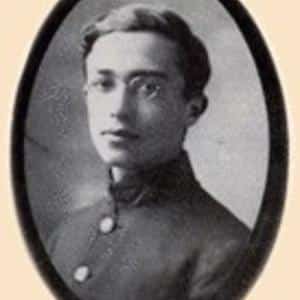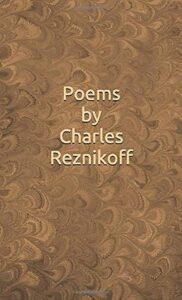Poet Charles Reznikoff described the experience of being Jewish in America
Charles Reznikoff (1894-1976) is best known for a multi-volume collection entitled Testimony: The United States 1885-1915. With William Carlos Williams and Ezra Pound, he was part of a group of poets known as the Objectivists, who treated the poem as an object used to explain a clear view of the world. Reznikoff continued as an Objectivist poet through his lifetime, focusing on immigrants, Black Americans, and the poor. For his last collection, Holocaust (1975), he used court testimony from war crimes trials and Nazi death camps as his research material.

Charles Reznikoff as a young man
Before he was labeled and associated with a group, Reznikoff was publishing poetry. He had his first two collections, Rhythms (1918) and Rhythms II (1919), privately printed for friends. Both were very short, more like short chapbooks, but already he was showing the writing style that would come to characterize his works of the 1930s and afterward.
Both reflect his birth and upbringing as a child of Russian immigrants. His Jewish parents had fled the pogroms of tsarist Russia, which had become especially intense between 1881 and 1884 after the assassination of Alexander II in 1881. One of the conspirators had Jewish roots, and it was all too easy to blame Russian Jews collectively. Reznikoff’s parents emigrated to the United States and settled in Brooklyn, where he was born in 1894.
He began writing poetry in his teens, and he self-published his first two collections in his mid-20s. They reflect his almost journalistic eye. He wanders through the Jewish neighborhoods of Brooklyn, and he remembers scenes and people from his childhood — stores and factories, shopgirls walking to work, beggars, accidents that happened in the streets, a scrubwoman, a winter scene in a park, and the hungry searching through garbage cans. He includes a long poem, “Four of Us,” that is clearly about his own family, and how and why they came to America.
And he captures part of the immigrant experience when he observes a funeral procession.
Ghetto Funeral

stumbling over the cobblestones
And his children, faces red and ugly
with tears, eyes and eyelids red,
In the black coffin in the black hearse
the old man
No longer secretly grieving
That his children are not strong enough
to go the way he wanted to go
And was not strong enough.
Under the heavens furrowed with clouds
A man behind his stumbling plough.
Trees shrugging their shoulders
in the wind
And the ceaseless weaving
Of the uneven water.
He reverses what we might have typically expected. Instead of setting the scene with the physical setting of clouds, trees, and water, he first describes the procession itself. Then he steps back and suggests there’s some kind of family failure, that the dead man’s children cannot go the way he himself wanted to go. Only then does he provide the description of the immediate physical environment and where the man had come from (“A man behind his stumbling plough”).
That’s a lot going on in a 15-line, tightly written poem.
Reznikoff was not a well-known poet in his lifetime. General critical reaction to his work was largely negative, and it was only toward the very end of his life that he found a publisher that believed in his work (Black Sparrow Press). But he influenced poets like Denise Levertov and May Swenson, and he wrote to ensure that no one would forget the Jewish experience in America and World War II’s Holocaust.
Photo by Harold Lloyd, Creative Commons, via Flickr. Post by Glynn Young.
How to Read a Poem uses images like the mouse, the hive, the switch (from the Billy Collins poem)—to guide readers into new ways of understanding poems. Anthology included.
“I require all our incoming poetry students—in the MFA I direct—to buy and read this book.”
—Jeanetta Calhoun Mish
- Poets and Poems: Donna Vorreyer and “Unrivered” - October 7, 2025
- Poet Sidney Lanier and the Lost Cause - October 2, 2025
- Poets and Poems: A.J. Thibault and “We Lack a Word” - September 30, 2025


Bethany R. says
What a fascinating last stanza in “Ghetto Funeral.”